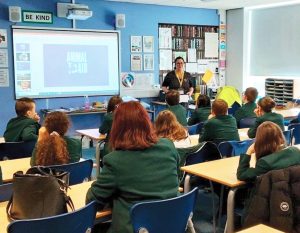Become a school speaker
Being a volunteer school speaker for Animal Aid can be a very rewarding experience.
We run workshops to train our speakers, and we provide all the resources they need.
Some of our speakers choose to visit primary, others secondary, and some visit both primary and secondary schools.
School Speakers must be at least 18 years old, be vegan and agree to all Animal Aid’s aims and objectives, which are to work, by all peaceful means, for an end to animal cruelty. Speakers must communicate the necessity of following medical advice from a doctor and must never give medical advice of their own
A speaker must also have:
• a good knowledge of animal rights issues
• adaptable communication skills
• good planning and reporting skills
• good email communication skills
• a DBS check (we can arrange this)
If you’re interested in this role, please read through the common questions below before you apply to become a school speaker.
Common questions
What do Animal Aid secondary school talks involve?
School speakers are required to give presentations and lead discussions on topics such as general animal rights, animal farming, veganism and animal experiments. Talks are usually delivered in-person in the classroom, but some people also give talks remotely.
Speakers deal with the issues raised in a sensitive way and encourage students to articulate their own views.
School visits usually last for an hour and are normally given to class size groups, although we are sometimes asked to give talks to larger groups.
A session typically involves giving a talk, showing a film, answering questions and running a group activity.
What do primary sessions involve?
We run primary sessions on animal welfare and pets to pupils in Year 1 to Year 6. Our primary programme is called Animal Kind and we have a dedicated website and film. Our visits normally last an hour and are usually with class size groups.
Rather than giving a talk, speakers involve children in a variety of activities including listening, talking, watching, writing, discussion and playing games.
A session typically involves looking at the needs of companion animals and discussing how to look after pets. Speakers talk about why it’s better to adopt a rescued animal, rather than buying one from a breeder. We also consider the needs of wild animals and discuss how we can help to protect them.
We run primary workshops to train speakers and provide all the resources that are required, including our AnimalKind film, activity ideas and props such as puppets, pictures, games and stories.
What do cookery demonstrations involve?
We deliver vegan cookery demonstrations to classes of Food and Nutrition students at secondary level and also to classes of pupils at primary level. These sessions, which typically last from an hour to two hours, normally involve demonstrating how to make a simple vegan chilli.
Depending on the time available, in addition to doing a 20-minute cooking demonstration, the session can involve showing a film, answering questions and running a group activity such as a quiz.
We run workshops to train cookery demonstrators and provide all the resources that are required such as recipes, films, PowerPoint presentations and activity ideas.
What happens at the training workshops?
At the speakers’ workshops, delegates receive instruction and discuss issues relating to speaking in schools. Depending on the type of workshop, delegates are required to give a short two-minute talk, give a short practice cookery demonstration with a partner, or demonstrate a primary age activity to the group. Delegates are assessed during the day and are informed as to whether or not they have passed a few days after the workshop.
When are the training workshops?
Once you’ve had a preliminary phone interview, we’ll give you the dates and locations for upcoming workshops.
Are training workshops free?
Attendance is free but there is a booking deposit of £15, which is refundable after the workshop has taken place. We are able to cover the cost of your travel to attend a workshop.
How many talks does a speaker typically give?
The number of talks a speaker is asked to give depends on how many requests we receive in their area. The number of talks a speaker agrees to undertake is entirely up to them.
How are requests for school talks generated?
The Animal Aid Education Department mails out to schools on a regular basis (usually once a term), offering talks on a range of subjects. In conjunction with Animal Aid, school speakers can, if they wish, also organise their own mailings to schools in their local area.
What issues will I be required to talk on?
Animal Aid speakers are asked to give talks on a variety of animal rights issues, although the most common topics are general animal rights and veganism.
Are Animal Aid school speakers required to have a Disclosure and Barring Service (DBS) check?
Yes, all Animal Aid speakers are required to have an enhanced Disclosure and Barring Service (DBS) check. Animal Aid will obtain one for you once you have qualified as a speaker.
If you have any other queries, please contact Natasha.
